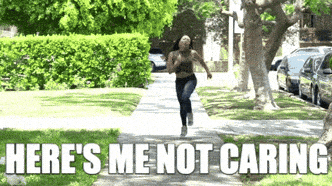🎭 I'm talking about your addiction to drama.
An abusive relationship puts us in a constant state of alertness.
The 𝗮𝗱𝗿𝗲𝗻𝗮𝗹𝗶𝗻𝗲 𝗿𝘂𝘀𝗵, the 𝗳𝗶𝗴𝗵𝘁 𝗼𝗿 𝗳𝗹𝗶𝗴𝗵𝘁 𝗿𝗲𝘀𝗽𝗼𝗻𝘀𝗲—they all become hardwired.
So, when the abuse ends, your brain still seeks out situations that trigger these responses. Drama becomes a way to feel 𝗮𝗹𝗶𝘃𝗲.
When you've been through trauma, drama can also be a form of pain relief.
Feeling 𝘯𝘰𝘳𝘮𝘢𝘭 and 𝘣𝘰𝘳𝘪𝘯𝘨 can be so uncomfortable for trauma survivors that they might also create drama, as a way to feel some sensation of aliveness.

My former self
This is how I'm breaking my own addiction to drama:
The first step was recognizing my addiction.
🤣 That was the easy part.
Then I worked on reducing my tolerance for drama.
I set a social-media-free period every day and gradually got used to the lack of dopamine hits that came from checking my social media every time I felt mildly uncomfortable, or even out of habit. I use AppBlock to lock my social media apps every weekday before midday and after 9 p.m.
Drama is contagious, so I used these techniques to shield myself even more.
🛡️ I started avoiding outrage porn, by unfollowing and blocking people in constant outrage mode.
🛡️ I left Facebook groups and friend groups where people fed off and encouraged drama.
🛡️ I avoid getting caught up in other people's drama by asking myself if responding to a post or comment is worth killing brain cells (more about this at the end).
🛡️ I also became intentional about how I channel my need for drama. I feed it with action movies and thrillers. They calm and distract me after a trauma response.
🛡️ I do an intense workout most mornings to release endorphins and set me up for the day.
You can also break your drama habit
Just start by understanding that your attraction to drama is a byproduct of your past, 𝗻𝗼𝘁 a reflection of who you truly are.
Then, just like I did, you can set boundaries on the people and situations that create unnecessary drama in your life (and that includes your ex).
You can create an environment that fosters positive interactions and discourages drama.
You can do this by working on mindset shifts and building your emotional resilience to deal with triggers and stressful situations.
When you have a thought that puts you in a “dramatic” (i.e. unnecessarily stressed) frame of mind, it helps to question its validity. You can ask yourself if there’s a healthier way to view the situation.
When you’re lowering your tolerance for drama, you’ll probably want to reframe drama-free situations. As abuse victims, we’re so used to a constant adrenaline rush that calm periods can feel downright boring and disappointing.
Instead of viewing these episodes as “boring”, you can see them as a chance to recharge your batteries. Make a conscious effort to enjoy these moments and incorporate them into your daily routine.
When the urge for drama feels overwhelming, you can channel it in healthier ways. Whether it’s an intentional hour spent watching reality TV (nothing vicariously quenches my thirst for drama like watching Gordon Ramsay throwing a dish into the trash) or action movies, it doesn’t impact your everyday life.
Some people also love squashing their drama bug by doing adventurous sports, joining an actual drama group, or starting some other creative endeavor.
One thing to remember in your journey to being drama-free:
It's only natural to slip back into old habits from time to time. That's why it's important to be self-aware and always be kind to yourself. If you want to keep yourself on track, you can start an accountability group with a friend or two who also want to live a drama-free life.
Want to know how I can help you?
Did someone forward this to you?
Resources
I've found Mel Robbins' "Let them" technique really helpful for stopping my dramatic impulses in their tracks, especially when people are being dramatic around me, whether it's IRL or on social media.
It's a simple but effective approach: it's about accepting that you can't control what others do, but you can control how you respond. By letting them act as they are, you can stop worrying about managing their behavior. This not only means you're less involved in unnecessary drama, but it also gives you the freedom to focus on your own well-being.
For instance, if someone close to you is causing chaos or falling short of your expectations, rather than getting caught up in frustration or disappointment, you can simply "let them" be. This doesn't mean you have to accept disrespect or allow your boundaries to be violated. It just means you choose not to engage in the drama. You keep your cool by understanding that their actions reflect on them, not you.
I highly recommend checking out Mel Robbins' podcast episode on this technique. It's a handy and freeing technique that can help you regain control of your emotions and create a calmer, drama-free life. You can listen to the episode here and start using the 'let them' technique in your daily interactions.

P.S. About those brain cells:
Did you know that when you argue with someone, it releases cortisol, which kills brain cells? So, before you dash off that angry/defensive text, email, or comment, ask yourself:
Is it worth losing brain cells over?
Nine out of ten times, I find it isn't.
My mantra in these situations is "𝘉𝘳𝘢𝘪𝘯 𝘤𝘦𝘭𝘭𝘴, 𝘣𝘳𝘢𝘪𝘯 𝘤𝘦𝘭𝘭𝘴, 𝘣𝘳𝘢𝘪𝘯 𝘤𝘦𝘭𝘭𝘴!"



